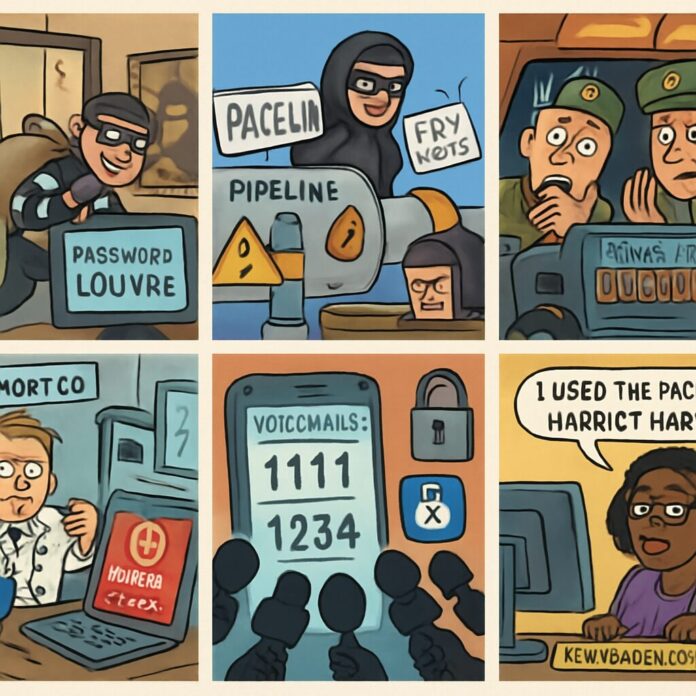Executive summary: Weak and predictable passwords have repeatedly exposed critical systems to cyber threats, resulting in significant financial losses, security breaches, and even risks to national security. From art heists to nuclear launch codes, these blunders underscore the urgent need for robust digital hygiene.
The recent resurfacing of a 2014 security report revealed that the password for the server managing the CCTV network at the Louvre Museum in Paris was simply “LOUVRE,” a glaring oversight that contributed to a heist team successfully targeting historical jewels last month. This incident highlights how commonplace weak passwords are, despite the frustration many feel over complex login requirements. Predictable credentials like these leave organizations vulnerable to attacks that can have far-reaching consequences, emphasizing the importance of stronger security measures in protecting cultural and financial assets.
In May 2021, the Colonial Pipeline, one of the largest fuel pipeline systems in the United States, was paralyzed by a cyberattack that accessed its network through a compromised password on a disused virtual private networking account. The company paid a $4.4 million ransom to end the attack, though the FBI later recovered much of the funds. Colonial Pipeline’s CEO emphasized that the password was not easily guessable, but the lack of multi-factor authentication allowed hackers to exploit it, causing widespread fuel shortages and highlighting infrastructure vulnerabilities that could disrupt essential services.
Perhaps most alarming is the revelation that between 1962 and the mid-1970s, the US nuclear launch code was set to eight zeros, according to former Air Force launch officer Bruce Blair. This simplistic password, coupled with unreliable enforcement of the two-man rule, meant nuclear war was just a few keystrokes away. The Strategic Air Command eventually implemented unique enable codes to add layers of security, but the episode serves as a stark reminder of how lax password policies can jeopardize global safety and the need for rigorous protocols in high-stakes environments.
On a smaller scale, a 158-year-old transport company in eastern England, KNP, was driven out of business in June 2023 after hackers guessed an employee’s weak password. The Akira group encrypted the company’s data and locked its systems, demanding a ransom that KNP could not pay. The director admitted never informing the employee responsible, illustrating how individual negligence can lead to collective ruin and job losses, and underscoring the domino effect of poor cybersecurity practices in small to medium enterprises.
The phone hacking scandal that rocked the UK involved journalists and private investigators accessing voicemails of public figures like Hugh Grant and Prince Harry by using default codes such as 1111 or 1234. This widespread practice, based on the assumption that few change their voicemail passwords, led to the closure of the News Of The World in 2011 and prompted inquiries into press ethics, demonstrating how weak passwords can invade privacy, damage reputations, and trigger regulatory reforms in media industries.
In a political context, UK Conservative Party leader Kemi Badenoch confessed in 2018 to hacking Labour peer Harriet Harman’s website a decade earlier by using the password “Harriet Harman.” While she apologized for the “foolish prank,” it underscores how easily accessible systems can be manipulated when passwords are obvious, even in high-stakes environments, and highlights the broader implications for trust and security in digital communications.
Looking ahead, these cases emphasize the critical importance of enforcing strong password policies and multi-factor authentication across all sectors. As cyber threats evolve, organizations and individuals must learn from past mistakes to protect sensitive data, maintain public trust, and foster a culture of cybersecurity awareness in an increasingly digital world.

